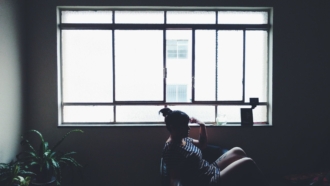“To truly cherish the things that are important to you, you must first discard those that have outlived their purpose. To throw away what you no longer need is neither wasteful nor shameful.”
That advice comes from Marie Kondo, the Japanese author and decluttering expert who has become perhaps the biggest contemporary challenge to mass consumption. A big part of her minimalist ethos — her book is titled The Life-Changing Magic of Tidying Up — is the idea that we’re buying way too much stuff, most of which does nothing to enhance our lives.
For the most part, Kondo focuses on mindless material things — the plastic crap, cheap clothing and general tchotchkes that clutter up our homes. She asks people to hold individual items in their hands to see whether they “spark joy.” If they don’t, she recommends that they get rid of them immediately.
But we can also use Kondo’s example to explore the idea of clutter much more broadly.
Think of it this way:
Before you declutter your house, shouldn’t you consider decluttering your mind?
The average American spends over 10.5 hours of their day consuming media, whether that’s watching TV, surfing online, using an app or listening to a podcast. What kinds of things do you take in on a daily basis — including Netflix shows, YouTube videos, the seemingly endless Internet hot takes and options on Tinder — and what impact do they have on not just your joy but your creativity?
When it comes to information, we’re often encouraged to think that the more, the better. We’re in an information economy, after all, so shouldn’t we tune in as much as possible?
But consider this: Are you confusing knowledge attainment with mindless consumption?
Manage your inflow
Srinivas Rao, author of An Audience of One: Reclaiming Creativity for Its Own Sake, says that managing our inflow — what and how much we consume — is crucial to creative output. “Excessive consumption and inflow inhibit creativity, negatively impacts our ability to do deep work and reduces our cumulative output,” writes Rao.
As CEO of Jotform, a business with over 140 employees and 4.9 millions of users, I know about the importance of creative output and I refuse to simply rely on the spark of inspiration to arrive in the midst of daily noise.
I’ve had to come up with effective methods for cultivating creativity. I’m committed to “morning pages,” a key way I’ve learned to tune out many of life’s overwhelming distractions so I can channel my own voice and vision.
Every morning, I mute my phone and create an empty space that I can fill with my own ideas.
As I’ve noted before, introducing restrictions — like powering down your phone — might be the true secret to unleashing creativity, even if that seems counterintuitive.
Let your mind wander
We live in an age of overstimulation, where we take our phones to the bathroom and use WiFi even on airplanes. We so rarely sit with our own thoughts because we spend so much time consuming the thoughts of others.
But according to boredom researcher (yes, that’s a thing) Dr. Sandi Mann, slowing down and letting your mind wander enables you to tap into both your conscious and subconscious mind — and that’s where you start to access the connections that drive creativity.
Heather Lench, a psychologist at Texas A&M University, has described being bored as “a seeking state” — and what is the process of creating if not actively seeking out new concepts, improvements and ways to engage with the world?
Manoush Zomorodi’s book Bored and Brilliant: How Spacing Out Can Unlock Your Most Productive and Creative Self has inspired Bored and Brilliant challenges, where participants are encouraged to watch but not photograph their world, to write down small observations about their environment, and to block out time when they won’t be available online — all with the aim of boosting their individual creative process.
According to research reported by Harvard Business Review, letting your mind wander and quieting the mind can lead to breakthrough insights. But to do that, you have to be willing to slow down and shut out competing influences.
That isn’t easy to do, especially at a time when more and more of our interaction is virtual, and more and more of our consumption is passive rather than participatory.
Don’t just consume — exchange ideas
Eric Weiner, author of The Geography of Genius, has explored the influence of social interaction in a “third place,” like the historic coffee houses of Vienna, where budding geniuses were spurred on by an exchange of ideas.
“People from all different walks of life go there and conversation is unstructured and flowing,” says Weiner.
Note the difference: In this case, you’re not simply consuming the ideas of others but actively contributing your own. Dialogue can spark inspiration or help make a good idea even better.
Narrow your focus
And there’s another way to think about limiting consumption to boost creation: Some experts suggest that focusing your energies is the key.
Instead of trying to come up with as many ideas as possible — those familiar “blue sky” meetings where whiteboards fill up with any and all suggestions — narrow the scope. Scott Anthony, the managing partner of Innosight and author of The First Mile, calls such constraints “the greatest enablers of creativity.”
How does that apply to consumption? Think about the wide range of ideas you consume every day; what if you narrowed the scope to things that are directly related to problems you’re actively trying to solve?
One of the ways I’ve learned to limit empty consumption is by establishing robust systems and automation — which takes more time on the front end but can save you lots of time down the road.
Cutting back busywork — everything from email responses to shopping for groceries in person — can leave you with additional time to do the important stuff, including giving your mind time to rest and renew. One of Rao’s top tips includes creating separate email accounts for essential versus non-essential messages, separating feedback from colleagues from notifications about hotel discounts.
Forget the FOMO
Constant consumption can be related to FOMO — or, fear of missing out.
We worry that if we aren’t informed about the latest research or haven’t read the latest viral articles, then we’re going to be left behind.
But while we might assume maximal consumption helps us stay at the top of our game, that kind of thinking can actually be counterproductive to the kind of productivity and creativity we’re actively trying to cultivate.
As we’ve become accustomed to refreshing our email every 30 seconds, we’ve compromised our creative potential.
So next time you get stuck, try scheduling a break and switching course, whether it’s taking a walk, having a shower or lying down for a 20-minute nap. You’ll be surprised how quickly your brain gets to work when you give it the space to explore.
Crucially, I’ve learned that creativity isn’t some sort of divine gift. Like anything else, it’s a muscle you have to exercise. And when you do that, you’ll see results.
And in a world where everyone’s always trying to do more, sometimes we can benefit from doing less — or, at least, from being more selective, more disciplined and more willing to spend time with our own thoughts instead of constantly chasing someone else’s influence.














Send Comment: